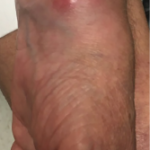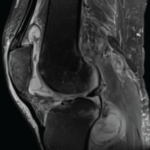PHILADELPHIA—Emerging data have indicated an association between anti–tumor necrosis factor–α (TNF-α) therapy with the incidence of nontuberculous mycobacterial (NTM) lung disease in patients with rheumatoid arthritis (RA).
According to Michael D. Iseman, MD, professor emeritus in the division of respiratory and infectious diseases at the University of Colorado School of Medicine in Denver, diagnosis of NTM lung disease is often delayed and can result in significant morbidity or death.
Speaking here at the recent ACR/ARHP Annual Scientific Meeting, Dr. Iseman said that patients should be screened prior to initiation of anti–TNF-α therapy and then closely monitored for NTM disease and tuberculosis (TB). Prevalence of NTM lung disease is greater than that of TB in the United States, he said.
“Rheumatoid arthritis disease patients are at increased risk of mycobacterial infections and fungal infections due to immunocompromising therapy or the lung damage associated with immunological disease. Both TB and non-TB mycobacterial infections are potentially life threatening,” Dr. Iseman said. “The price of freedom from mycobacterial infections in this era of rheumatologic disease therapy is eternal vigilance.”
Patients at High Risk
Patients most at risk for NTM are elderly women and patients with chronic obstructive pulmonary disease, silicosis, sarcoidosis, cystic fibrosis, chronic gastroesophageal reflux disease, and rheumatoid ankylosing spondylitis. Also, healthy young women who are taller than average have been identified as high risk if they are slender and have a low body mass index, narrow anteroposterior diameter, subtle scoliosis, mitral valve prolapse, and hypomastia, he said.
Dr. Iseman reviewed data from research by Kevin L. Winthrop, MD, and colleagues that were recently published in Emerging Infectious Diseases.1 Winthrop and colleagues reported that patients using infliximab, etanercept, and adalimumab are at increased risk for granulomatous infection, including activation of latent TB. This research found the highest incidence in patients using infliximab (73 cases), followed by etanercept (25 cases) and adalimumab (seven cases).
In that research, investigators reviewed the Food and Drug Administration (FDA) MedWatch database, a voluntary system, for reports over a five-year period of NTM disease in patients who were using anti–TNF-α therapy. Among the 105 cases that met the NTM disease criteria, 70% had RA, and most were elderly women. In addition to the TNF therapy, most patients were taking prednisone or methotrexate.
For most of the patients, the lung was the most frequently reported site of infection, they said, with the remainder extrapulmonary or disseminated. Those patients with pulmonary NTM lung disease were more likely to have underlying RA.



